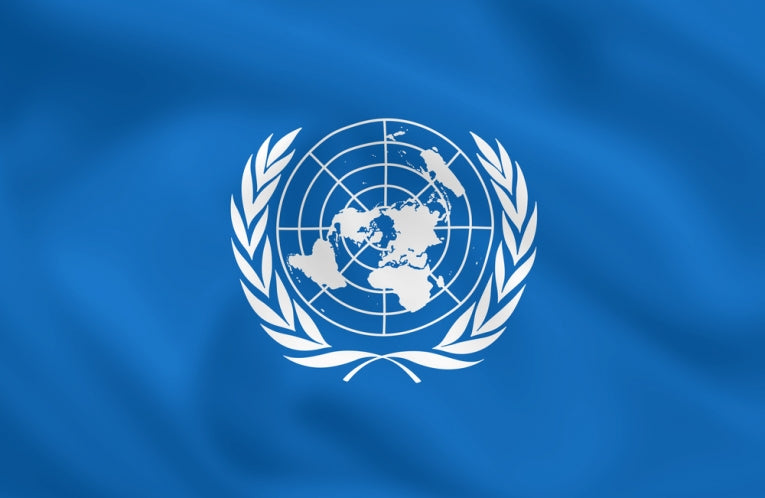Following the ending of World War I, the Great War, in 1918 and the signing of a formal Peace Treaty at Versailles the following year, it was decided to establish a "League of Nations" that would encourage disarmament and help prevent future outbreaks of war.
The grand idea was that negotiations and diplomatic measures would settle any international disputes and the quality of life around the world would be improved. Unfortunately within 20 years another world war had broken out, proving that although the League of Nations had the best intentions, it did not achieve what it set out to do. In other words, "A" for effort, but "E" for achievement.
It was clear that if another such catastrophe were to be avoided in the future, although something similar would be required, it would need to take a different form in order to give it more teeth. Ideas for a future organisation began to emerge in various declarations signed at Allied wartime conferences.
President F D Roosevelt had first used the term "United Nations" shortly after US entry into World War II, when he referred to a "Declaration by the United Nations" on 1st January 1942.
Between August and October 1944 representatives of the United Kingdom, the United States, the USSR and the Republic of China met at Dumbarton Oaks in Washington DC to discuss what was to replace the old League of Nations. As a result, proposals were made that outlined the purposes of a United Nations organisation, its membership and the arrangements to be made to maintain international peace and security, together with international economic and social co-operation.
It was decided that the new organisation would be open to any nation that had joined the Allies by 1stMarch 1945 and on 25th April 1945 a conference was held in San Francisco to draft a UN Charter. The governments of the 51 original members of the UN formally ratified this Charter on 24thOctober 1945 and the United Nations formally came into being.
In 1947 it was decided that 24th October should from henceforth be United Nations Day and this was first observed on 1948.
The original leaders of the UN had a somewhat optimistic hope that the new organisation would act to prevent conflict between nations and make future wars impossible, but within a very short time the infamous "Iron Curtain" that was identified by Winston Churchill had descended across Europe, where it was to stay for the next 44 years until it was finally lifted in 1991.
Following the ending of the Cold War, with several dozen active military conflicts continuing to rage across the globe, there were renewed calls for the UN to take on the role of international peacekeeper.
There are now 191 members of the UN and the success of the UN depends entirely on the goodwill and co-operation of its membership. Sanctions can be imposed on members who step out of line, but that is about all.
United Nations Day is devoted to highlighting the aims and achievements of the organisation. The original hope had been that this day would become an international holiday and it was recommended that it should be a public holiday in all member states. This has not happened, but United Nations Day now forms a central part of United Nations Week that runs from 20thto 26thOctober each year.
The theme for 2012 United Nations Day is "Solutions for a Prosperous World" and the day will focus on the eight UN Millennium Development Goals, together with the global plan to achieve these goals by 2015. Most of the goals have specifically designated UN days to support them.
These are obviously aspirational goals and when they were set it was felt that they were all achievable, but with only three years left to run, some still seem to be a dream rather than a reality. All of the goals need a universal willingness in order to see them through and this is not always forthcoming.
The goals, in no particular order are:
to eradicate extreme poverty and hunger
to achieve universal primary education
to promote gender equality and the empowerment of women
to reduce child mortality
to improve maternal health
to combat HIV/AIDS, malaria and other diseases
to ensure environmental sustainability
to develop a global partnership for development.
The original UN Charter did not just concentrate on it being an international peace force; international economic and social co-operation also featured very highly. The UN works with many specialised agencies, including the World Health Organisation (WHO), the Food and Agriculture Organisation (FAO), the United Nations Educational, Scientific and Cultural Organisation (UNESCO), the United Nations Children's Fund (UNICEF), the International Labour Organisation (ILO), the United Nations High Commissioner for Refugees (UNHCR) and the United Nations Human Rights Council (UNHRC).
The achievements made by these organisations certainly make United Nations Day a day worth commemorating and while it is true that targets for achieving the Millennium Goals seem unlikely to be met, awareness has been raised and considerable progress has been made in all directions.
Added to this, in the 67 years since the original 51 members signed the UN Charter there has been no major conflict in the world and this in itself is surely something worthy of celebration.










